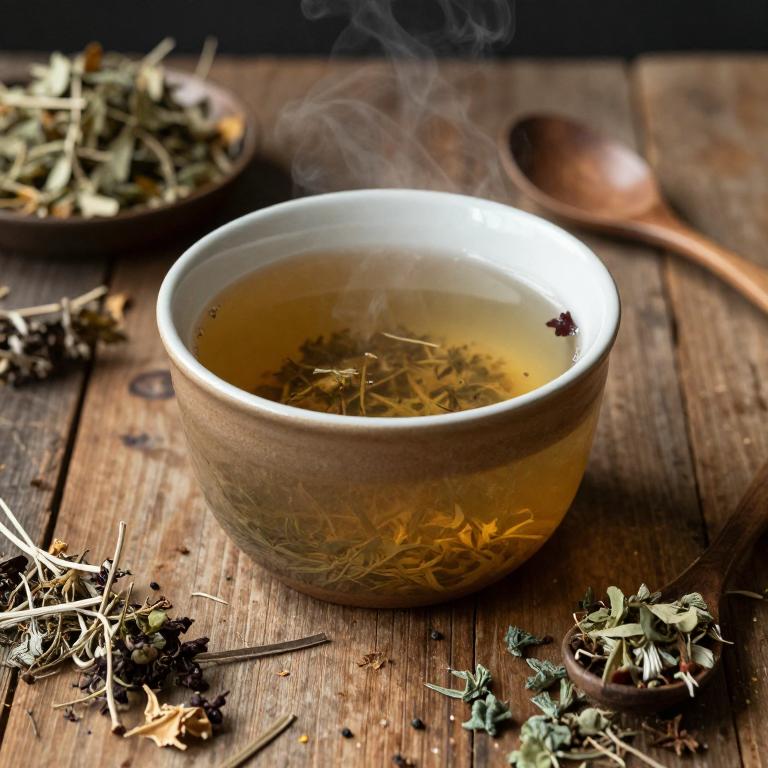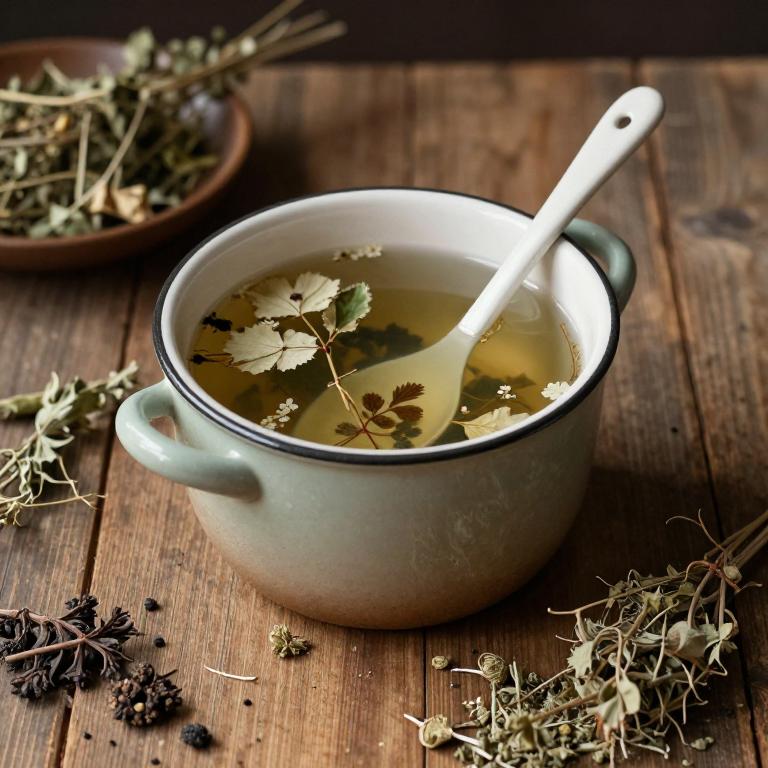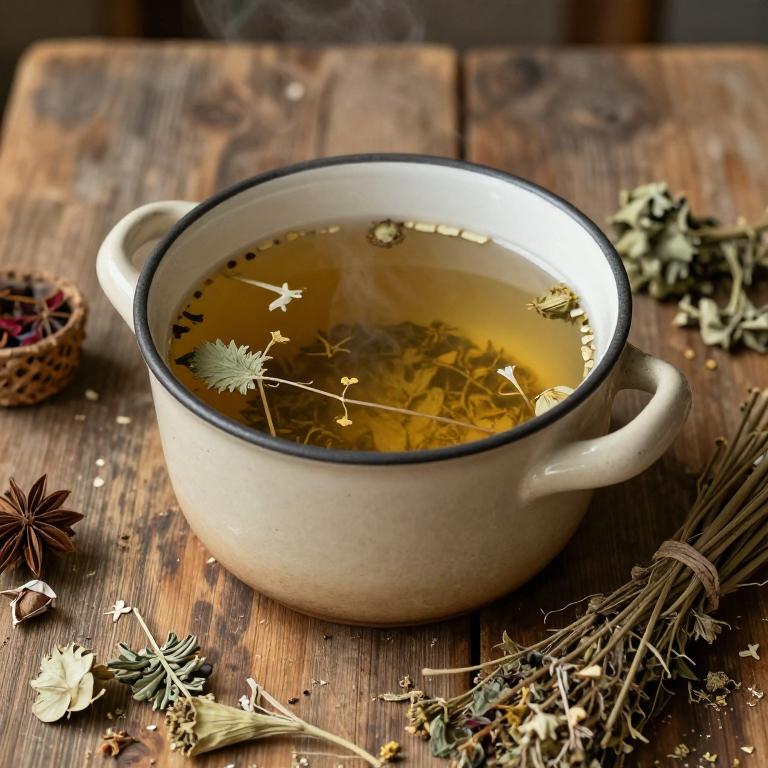10 Best Herbal Decoctions For Runny Nose

Herbal decoctions have been traditionally used to alleviate symptoms of a runny nose, particularly in cases of allergies or colds.
Common herbs such as eucalyptus, ginger, and thyme are often included in these formulations due to their decongestant and anti-inflammatory properties. To prepare a decoction, the herbs are simmered in water for an extended period to extract their active compounds. This method allows for the gentle release of beneficial phytochemicals that can help reduce nasal congestion and soothe irritated mucous membranes.
While herbal decoctions can be a natural and effective remedy, it is important to consult with a healthcare provider, especially for individuals with existing health conditions or those taking medications.
Table of Contents
- 1. Eucalyptus (Eucalyptus globulus)
- 2. Ginger (Zingiber officinale)
- 3. Salvia (Salvia officinalis)
- 4. Thyme (Thymus vulgaris)
- 5. Stinging nettle (Urtica dioica)
- 6. Peppermint (Mentha piperita)
- 7. Catnip (Nepeta cataria)
- 8. Ceylon cinnamon (Cinnamomum verum)
- 9. Echinacea (Echinacea purpurea)
- 10. Parsley (Petroselinum crispum)
1. Eucalyptus (Eucalyptus globulus)

Eucalyptus globulus, commonly known as the Tasmanian blue gum, is often used in herbal decoctions to alleviate symptoms of a runny nose.
The leaves of this plant contain compounds such as eucalyptol, which possess antimicrobial and decongestant properties. To prepare the decoction, fresh or dried leaves are simmered in water for several minutes, allowing the active compounds to infuse into the liquid. This herbal remedy is frequently used in steam inhalations or as a gargle to reduce nasal congestion and mucus production.
While generally safe, it is advisable to consult a healthcare professional before using eucalyptus globulus, especially for individuals with asthma or during pregnancy.
2. Ginger (Zingiber officinale)

Zingiber officinale, commonly known as ginger, has been traditionally used in herbal medicine to alleviate symptoms of a runny nose, often associated with colds or allergies.
Its active compounds, such as gingerol and shogaol, possess anti-inflammatory and decongestant properties that help reduce nasal congestion and mucus production. A ginger herbal decoction can be prepared by simmering fresh or dried ginger root in water, allowing the beneficial compounds to infuse into the liquid. This decoction can be consumed warm to soothe the respiratory tract and provide relief from nasal discomfort.
While generally safe, individuals with certain health conditions or on medication should consult a healthcare provider before using ginger as a remedy.
3. Salvia (Salvia officinalis)

Salvia officinalis, commonly known as sage, has been traditionally used in herbal medicine for its potential benefits in treating respiratory conditions, including a runny nose.
Herbal decoctions made from dried sage leaves are often prepared by simmering the plant material in water to extract its active compounds, such as flavonoids and essential oils. These decoctions are believed to possess antimicrobial and astringent properties that may help reduce nasal secretions and soothe irritated nasal passages. Some studies suggest that sage may help alleviate symptoms of rhinitis by reducing inflammation and mucus production.
However, while sage decoctions are generally considered safe for short-term use, it is advisable to consult a healthcare professional before using them, especially for individuals with allergies or chronic respiratory conditions.
4. Thyme (Thymus vulgaris)

Thymus vulgaris, commonly known as thyme, has been traditionally used in herbal medicine for its antimicrobial and anti-inflammatory properties.
Herbal decoctions made from thymus vulgaris are often prepared by simmering the dried leaves and flowers in water to extract their active compounds, such as thymol and carvacrol. These decoctions are believed to help alleviate symptoms of a runny nose by reducing nasal congestion and combating respiratory infections. The aromatic compounds in thyme may also stimulate the nasal passages, promoting clearer breathing.
While thyme decoctions are generally considered safe, it is advisable to consult a healthcare professional before use, especially for individuals with allergies or chronic respiratory conditions.
5. Stinging nettle (Urtica dioica)

Urtica dioica, commonly known as stinging nettle, has been traditionally used in herbal medicine for its various therapeutic properties.
When prepared as a herbal decoction, stinging nettle may help alleviate symptoms of a runny nose by reducing inflammation and supporting respiratory health. The decoction is typically made by simmering dried or fresh nettle leaves in water for an extended period to extract its active compounds. Some studies suggest that the plant contains compounds with antihistaminic and anti-inflammatory effects, which may help reduce nasal congestion and excess mucus production.
However, it is important to consult with a healthcare professional before using stinging nettle, especially for individuals with allergies or those taking medications.
6. Peppermint (Mentha piperita)

Mentha piperita, commonly known as peppermint, has been traditionally used in herbal medicine to address respiratory issues, including a runny nose.
Peppermint herbal decoctions are prepared by simmering the fresh or dried leaves of the plant in water, allowing the essential oils and active compounds to infuse into the liquid. These decoctions are believed to help reduce nasal congestion and alleviate symptoms of a runny nose by acting as a decongestant and anti-inflammatory agent. The menthol content in peppermint can stimulate the nasal passages, promoting a sense of relief and clearing mucus.
While generally considered safe for short-term use, it is advisable to consult a healthcare professional before using peppermint decoctions, especially for prolonged periods or in individuals with certain health conditions.
7. Catnip (Nepeta cataria)

Nepeta cataria, commonly known as catnip, has been traditionally used in herbal medicine for its potential to alleviate symptoms of a runny nose.
When prepared as a herbal decoction, it involves boiling the dried leaves and flowers of the plant in water to extract its essential oils and active compounds. The expectorant and antispasmodic properties of nepeta cataria may help reduce nasal congestion and thin mucus, making it useful for conditions like allergic rhinitis or the common cold. However, it is important to note that while some anecdotal evidence supports its use, scientific research on its effectiveness for runny nose is limited.
As with any herbal remedy, it is advisable to consult a healthcare professional before use, especially for individuals with underlying health conditions or those taking other medications.
8. Ceylon cinnamon (Cinnamomum verum)

Cinnamomum verum, commonly known as true cinnamon, has been traditionally used in herbal medicine to alleviate symptoms of a runny nose.
The aromatic oils found in cinnamon bark, particularly cinnamaldehyde and eugenol, possess antimicrobial and anti-inflammatory properties that may help reduce nasal congestion and mucus production. To prepare a herbal decoction, a few dried cinnamon sticks are simmered in water for several minutes, allowing the active compounds to infuse into the liquid. This warm infusion can be consumed as a tea or used as a steam inhalation to soothe nasal passages.
While cinnamon may offer some relief for a runny nose, it is advisable to consult a healthcare professional, especially for persistent or severe symptoms.
9. Echinacea (Echinacea purpurea)

Echinacea purpurea, commonly known as purple coneflower, is a popular herbal remedy used to support immune function and alleviate symptoms of the common cold, including a runny nose.
Herbal decoctions made from Echinacea purpurea typically involve simmering the dried roots, leaves, or flowers in water to extract their active compounds. These decoctions are believed to possess anti-inflammatory and antimicrobial properties that may help reduce nasal congestion and mucus production. Some studies suggest that Echinacea can shorten the duration of cold symptoms, though results are mixed and more research is needed.
As with any herbal remedy, it is important to consult with a healthcare provider before use, especially for individuals with allergies or those taking other medications.
10. Parsley (Petroselinum crispum)

Petroselinum crispum, commonly known as parsley, has been traditionally used in herbal medicine for its potential benefits in alleviating symptoms of a runny nose.
The herbal decoctions made from fresh or dried parsley leaves are believed to help reduce nasal congestion and mucus production due to their mild decongestant properties. These decoctions often contain compounds like apiol and limonene, which may have anti-inflammatory and antispasmodic effects. To prepare the decoction, the leaves are typically boiled in water for several minutes, then strained and consumed as a tea.
While parsley decoctions are generally considered safe for short-term use, they should be used with caution, especially for individuals with sensitive stomachs or those taking certain medications.